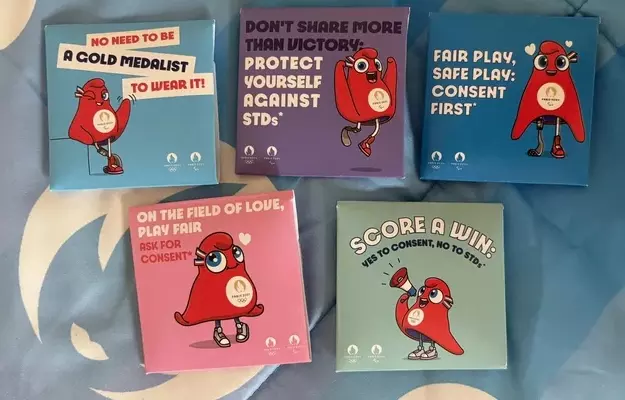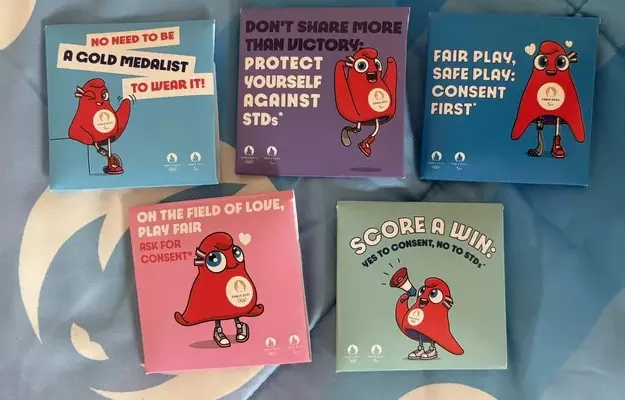
The 2024 Paris Olympics are in full swing, and while the world’s top athletes are busy competing for gold, a different kind of prize has caught the attention of the internet: Olympic condoms. These prophylactics, adorned with cheeky slogans like “In the field of love, be fair, ask for consent” and “No need to be a gold medalist to wear it,” have become the talk of the town, sparking a wave of hilarious reactions and commentary. It seems that the Olympic Village is not just a hub for athletic prowess but also a playground for romance and mischief, where the athletes might just be aiming for a different kind of medal.
One Twitter user couldn’t help but draw a comparison to the long-awaited video game, quipping, “We got Olympic condoms before GTA 6.” The irony of receiving these condoms alongside a fancy Olympic-branded cellphone that costs around $1,000 each has not escaped the notice of the masses. As one sarcastic commenter pointed out, “They give every athlete a fancy phone that costs like $1000 each but can’t provide a decent mattress for them to sleep on?” Clearly, the Olympic Committee believes that love, like sport, requires the right equipment. After all, what’s a little competition without a few “extra-curricular” activities?
The Paris Olympics have been boasting about their commitment to sustainability and environmental friendliness, but the contents of the athletes’ welcome kits seem to tell a different story. As one user hilariously pointed out, “I love how the Paris Olympics were boasting about how environmentally friendly they are but still give the Olympians TWO water bottles and a toiletries bag like they don’t already have them???” It’s almost as if they expect athletes to hydrate and have a good time in equal measure.
It’s a classic case of “do as I say, not as I do,” and the internet is having a field day with it. The juxtaposition of eco-friendly initiatives and excess has created a perfect storm of sarcasm and wit, with one commenter quipping, “They give every athlete a fancy phone that costs like $1000 each but can’t provide a decent mattress for them to sleep on?” Perhaps the athletes are expected to get their rest in the arms of a fellow competitor instead. After all, nothing says “team spirit” quite like sharing a bed—or a few intimate moments—after a long day of competition.
Of course, the real star of the show is the Olympic condom. With 300,000 of these prophylactics being distributed to athletes, it’s clear that the organizers are taking the safety and well-being of their competitors seriously. As one user aptly put it, “I love the condoms; it’s so funny. Apparently, it’s a big thing.” Who knew that the Olympic Village would be the hottest spot for both athletic and romantic encounters? One can only imagine the late-night “training sessions” happening behind closed doors, where athletes are perfecting their “technique” in more ways than one.
For the athletes competing in the Olympics, safety is top of mind! Rumors about the happenings in the Olympic Village have infamously swirled over the years, particularly talk around intimacy between athletes residing in their home away from homes during the Games. The topic continued to make headlines during the 2020 Tokyo Olympics due to the “sex ban” that was enacted, in part due to the enforced social distancing requirement amid the COVID-19 pandemic (which caused the postponement of the Games to 2021).
Ahead of the 2024 Paris Summer Games, Team USA’s Olympic Village Director Daniel Smith confirms to PEOPLE that the ban has been lifted for athletes competing in the “city of love” and organizers are taking proper — and creative — precautions to ensure the safety of all. Daniel says “it’s true” 300,000 condoms have been distributed to the Olympic Village. Plus, he points out, “The packaging is quite spectacular!”
Since athletes began their move-ins to the Village, many of them have taken to social media to share glimpses of the swag bags and toiletry gift bags they were gifted. The “really quirky packaging” was showed off in a TikTok video posted by Canadian sailor Sarah Douglas. In the clip, the athlete held up blue and pink condom holders emblazoned with messages such as “On the field of love, play fair [and] ask for consent” and “No need to be a gold medalist to wear it.” It also includes the Paris Games’ mascot, the Olympic Phryge.
Three years ago, there were claims that they were intentionally designed to be ‘anti-sex’ and would fail under physical exertion. However, McClenaghan dispelled that myth in a viral video, and the often-shirtless 25-year-old has now addressed it again with renewed vigor. “Maybe I wasn’t rigorous enough,” says the pommel horse world champion before demonstrating a dynamic routine that features a belly flop and a handstand.
While the condoms are distributed to the Village, Smith tells PEOPLE that they also keep them in their “athlete resource center,” which he says “is a space for athletes only and they can take as they need.” As for whether athletes can have sex with athletes from other countries? Smith says, “We try to avoid that, to be frank.” He clarifies, “It’s not so much for the sex, it’s more for security reasons.”
Regardless of whether the athletes want to be intimate or not, Team USA’s Olympic Village delegation has various rules and regulations in place regarding who’s allowed access into its housing. Each country’s team lives together. Therefore, Smith says athletes from other countries “can come into a common area,” but he says, “we try to keep athletes from other countries out of our residential space… out of our sleeping rooms.” Another rule Team USA enforces to ensure “a distraction-free environment” within the Olympic Village are quiet hours. Residence halls enforce them from 10:00 p.m. to 7:00 a.m. local time. “We want to be very respectful,” Smith says, stressing “not only of our athletes, but of other athletes.”
For Team USA, specifically, alcohol is prohibited in the Olympic Village. “It is a dry Village for Team USA,” Smith makes clear. The Olympic Games are near, and another sacred, long-honored tradition is returning along with them: free condoms. Every four years, the number of condoms heading to the Olympic Village becomes a hot, titillating topic — from the record-breaking 450,000 condoms at the 2016 games in Rio de Janeiro to the intimacy ban at the 2020 games in Tokyo, sex (and the amount of contraceptives) at the games always sparks a very heated, very horny discussion.
This year, Olympic Village director Laurent Michaud told Sky News that there are a whopping 300,000 condoms available for the 10,500 athletes competing at the 2024 Paris Games (that’s almost 29 condoms per athlete, mind you). “It is important that the conviviality here is something big,” Michaud said. Over email, a Paris 2024 spokesperson confirmed to PS that there will be 200,000 male condoms, 10,000 male condoms without latex, 20,000 female condoms, and 10,000 oral dams — all of which are accompanied with a lubricant pouch — available in the Village. “We don’t know how many people are likely to use them and obviously we’ll adapt to the requirements if needed,” Laurent Dalard, who’s running the first aid and health services at Paris 2024, told Agence France-Presse.
Along with the condom program, this year’s Olympics will “be rolling out a campaign to raise awareness of the main STIs and their modes of transmission at the Polyclinique des Jeux,” according to the aforementioned Paris 2024 spokesperson, and the messages will focus on consent and pleasure. There will also be screening tests, mainly for HIV, at the polyclinic, with treatment and medication available for these STIs if needed.
In the week leading up to the Opening Ceremony on July 26, athletes, shared this year’s branded condoms, which feature the Paris 2024 mascot, the Olympic Phryge, and have on them various expressions like, “No need to be a gold medalist to wear it,” and, “On the field of love, play fair: ask for consent.”
While seemingly salacious, condoms have been distributed at the Olympics for almost 40 years now. The first reported instance of condoms being handed out to athletes was in the summer of 1988 when the games were held in Seoul, South Korea. Around 6,000 condoms were sent to the Village to draw awareness to HIV and AIDS prevention and to promote safe sex and “healthy behaviors,” according to the International Olympic Committee. After that, you could say the rest was history, and condoms at the Olympics became a tradition. One packaging said “Don’t share more than Victory. Protect yourself against STDs”
Now, condoms aren’t handed out in the Olympic Village to encourage sexual activity, per se — again, they’re mainly brought in to raise awareness of the spread of STIs and for the athletes to bring back to their home countries. But at the 1992 summer Olympics in Sydney, it was clear that the athletes may have been getting more use out of the condoms than a sex-ed lesson. The organizers for the Sydney games had to order 20,000 more condoms after they realized the initial 50,000 wasn’t enough for the nearly 11,000 athletes. While it’s unclear how many condoms are being used in the Village, Ryan Lochte told ESPN in 2012 that he guesses 70 to 75 percent of athletes are sexually active.
But not all athletes are amused at the spectacle the condom program brings to the games. “It is an absolutely huge allocation of condoms,” Zac Purchase, Olympic rowing gold and silver medallist, said in a 2016 interview. “But it is all so far from the truth of what it’s like to be in there. It’s not some sexualized cauldron of activity. We’re talking about athletes who are focused on producing the best performance of their lives.”
The condoms have also sparked a more serious conversation about accessibility and equality. One commenter pointed out the irony of providing free condoms to athletes while neglecting the needs of the homeless population, saying, “France gives athletes sanitary products (even if they have the money to buy it) but doesn’t help all the people who really need it like the homeless people … that’s really sad; all that money should be for the people who need it.” Still, one can’t help but wonder if the athletes will be using these condoms for more than just their intended purpose—perhaps to create a new sport: “Condom Toss” or “Bed Olympics,” where the only requirement is to keep it playful and safe. After all, who wouldn’t want to see a little friendly competition in the bedroom?
Of course, no discussion of Olympic condoms would be complete without a healthy dose of conspiracy theories. One user jokingly wondered, “What if condoms are already broken because they want to make super athletes? Or baby Olympics?” Imagine a future where Olympic champions are not just celebrated for their athletic feats but also for their prowess in the bedroom. The thought of a new generation of “Baby Olympians” training for the games of the future is enough to make anyone chuckle. Who knows? Maybe the next Olympic event will be a “relay race” of a different kind!
In the end, the Olympic condoms have become a symbol of the games themselves: a mix of seriousness and silliness, of competition and camaraderie. As the world watches the athletes compete for gold, they’ll also be keeping a close eye on the condoms, waiting to see what other surprises and sassy reactions they might inspire. After all, in the Olympic Village, it seems that the motto might just be: “Faster, Higher, Stronger… and a little naughtier!” So, let the games begin—both on and off the field!
